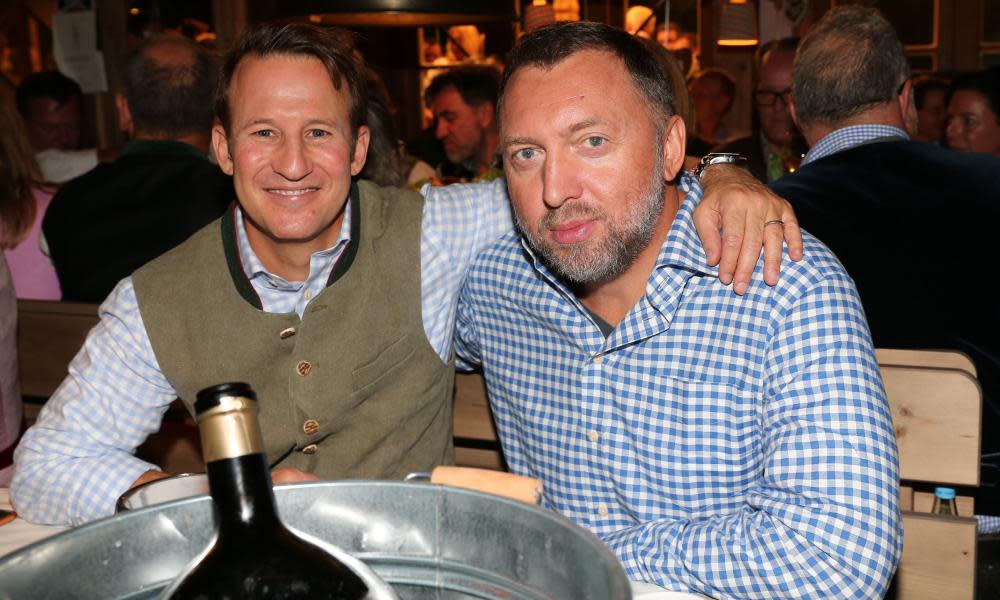US lobbyist for Russian oligarch visited Julian Assange nine times last year

A longtime US lobbyist for the Russian oligarch Oleg Deripaska visited Julian Assange nine times at the Ecuadorian embassy in London last year, according to visitor logs seen by the Guardian.
Adam Waldman, who has worked as a Washington lobbyist for the metals tycoon since 2009, had more meetings with Assange in 2017 than almost anyone else, the records show.
It is not clear why Waldman went to the WikiLeaks founder or whether the meetings had any connection to the Russian billionaire, who is now subject to US sanctions. But the disclosure is likely to raise further questions about the extent and nature of Assange’s alleged ties to Russia.
US intelligence agencies concluded with “high confidence” last year, in an unclassified intelligence assessment, that the Kremlin shared hacked emails with WikiLeaks that undermined Hillary Clinton’s presidential campaign as part of its effort to sway the 2016 election in favour of Donald Trump.
Waldman is a lawyer and consultant in Washington and Deripaska’s primary lobbyist. He also represents other clients including Hollywood stars. Last year Deripaska paid Waldman about $562,000. According to filings to the Department of Justice (DoJ) by Waldman’s firm, the Endeavor Group, his work for Deripaska focused on advising the oligarch’s company UC Rusal on legal issues.
When Deripaska first hired him, in 2009, Waldman’s firm was on a $40,000-per-month retainer. The Russian magnate was having problems obtaining a visa because of alleged connections to organised crime, which Deripaska denies. Waldman lobbied the US government to get Deripaska a visa.
Waldman also served as a counsel for Russia’s foreign minister, Sergei Lavrov. A 2010 DoJ filing showed that the Endeavor Group was hired by Lavrov to help ease the “persistent state of limbo” that Deripaska faced as a result of his being refused entry into the US. In a letter to Waldman, Lavrov hailed Deripaska as one of Russia’s “prominent business leaders”.
Waldman declined to answer questions from the Guardian about his meetings with Assange or whether they were connected to the Russian billionaire.
Waldman has not registered himself as a lobbyist for the WikiLeaks founder.
A report last year by Fox News, which obtained leaked text messages between Waldman and the US senator Mark Warner, the top Democrat on the Senate intelligence committee, suggested Waldman tried to broker a deal between Assange and the DoJ and that the negotiations were fruitless. It is not clear whether Waldman was brokering the deal on Assange’s behalf or someone else’s.
One text sent by Waldman in April 2017 said: “I convinced him [Assange] to make serious and important concessions and am discussing those [with] DoJ.”
The logs, obtained by the Guardian and Focus Ecuador, reveal details of Assange’s life inside the Ecuadorian embassy, where he has been staying since June 2012. Waldman allegedly visited Assange twice on 12 and 13 January 2017, days before Trump’s inauguration as president, and again immediately after the ceremony, on 27 January.
The Guardian has separately corroborated that Waldman was in London in late March, when he saw Assange twice more. He visited the embassy three times in April and made two more visits at the end of November 2017.
Deripaska is a key person in the investigation by the special counsel Robert Mueller into alleged collusion between the Trump campaign and Moscow.
According to the Associated Press, Trump’s future campaign manager Paul Manafort began work for Deripaska in 2005 and pitched a plan that would “greatly benefit [Vladimir] Putin’s government.” In 2006 Manafort signed a $10m annual contract with Deripaska, a close ally of Russia’s president.
In summer 2016, when he was Trump’s campaign chief, Manafort offered Deripaska a confidential briefing, emails turned over to Congress and Mueller show. The briefing never happened, Manafort says. Deripaska was filmed soon afterwards on his luxury yacht discussing the forthcoming US election with Russia’s deputy prime minister, Sergei Prikhodko.
Deripaska was subjected to more US sanctions in April. They were imposed on close associates of Putin’s in retaliation for alleged Kremlin meddling in the US vote. Meanwhile, Manafort faces multiple charges of money laundering arising from his work in Ukraine, and accusations of tampering with potential witnesses. He denies all charges. His bail was revoked last week and he is now awaiting trial in prison.
Waldman’s relationship with Deripaska goes beyond consultancy. According to filings, in 2008 he travelled to Moscow, Amsterdam and Siberia with the oligarch for the purpose of “friendship”. In 2015 Waldman and his German second wife, Barbara Sturm, posed for photos with Deripaska at Munich’s Oktoberfest. Sturm, a dermatologist and beauty expert, has a major business presence in Russia.
In April Waldman placed an article by Deripaska with the conservative Daily Caller news website, sources say. The oligarch called allegations of collusion “invented” and said he and the Russian government were victims of a “deep state” Washington plot.
Waldman has cultivated connections with senior Democratic politicians and spent summers with many of them in Martha’s Vineyard.
According to filings, Deripaska has paid Waldman via a series of offshore firms, with cash routed via shell companies in the British Virgin Islands, Belize and Jersey. At least one of Deripaska’s companies, Sea Chaika Corporation, appears in the Panama Papers. In 2010 it transferred at least $85,000 to Waldman’s accounts. Sea Chaika is connected to anonymous firms registered in Cyprus.
Deripaska and UC Rusal did not comment. Assange has denied the hacked Democratic party emails released by WikiLeaks in 2016 came from Moscow.
Last month Lenín Moreno, the president of Ecuador, said Assange could continue to live in the embassy as long as he complied with the conditions of his stay and avoided voicing political opinions on Twitter. In March, Moreno restricted Assange’s visitors, cut his internet access and shelved a $5m (£3.7m) secret spy operation to protect him, called “Operation Hotel”.

 Yahoo News
Yahoo News 
